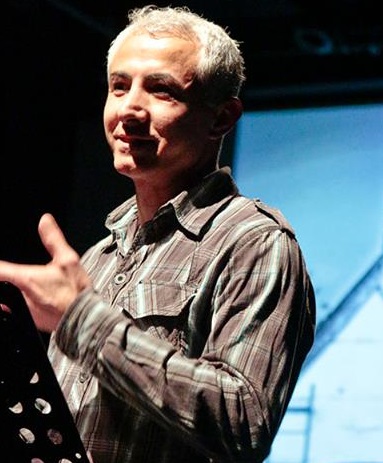4,380 Total views, 1 Views today
By: Miran Abraham
In the pre-dawn darkness, she abruptly woke me, her face marked by evident fear. Restlessly pacing around the room, she forcefully yanked down the red satin curtains and stuffed them into a backpack she had strategically placed in the center of the room. Struggling to close the bag, it was apparent she had begun packing while I was still asleep, leaving it only half-full.
Outside, the air was filled with cacophonous noise. Distant, booming shots reverberated, punctuating the tense atmosphere. As we stood together in front of the house, the rain intensified. People, young and old alike, scattered in panic—crying, yelling, and screaming in fear. The whistle of bullets and the splashing sound of impact against concrete walls provided an unsettling backdrop.
Her terror seemed to paralyze her, leaving her unsure of the direction to take in our frantic escape. Amid a passing crowd, she seized my hand, guiding me into its midst. Unnoticed, we traversed from one wall to another, silently navigating the neighborhood’s streets to the town’s edge, where we found ourselves on a narrow, muddy path.
Following obediently behind the throng, we progressed until we reached a different path. Ahead and behind us, a vast gray mass of people hurriedly rushed by, consumed by concerns about their possessions. The path narrowed further, making it impossible for us to walk side by side. On one side, a towering rock wall; on the other, a wide, open pit.
She slowed her pace, and I led her forward. She screamed for me to stop, but we couldn’t halt in this perilous place. The group’s anxiety made it precarious, and any sudden movement could send us tumbling into the ravine. I supported her under her armpit, my shoulder aiding her unsteady steps. Rain-soaked paths made the ground slippery, and our feet struggled to maintain traction around the sharp bend.
The road stretched wide, and I carefully laid her on the roadside, her back against the unyielding rocks. She seized my hand, pulling me close. In her wide eyes, brimming with fear, she locked her gaze onto mine, softly pleading, “Help me, I’m done with it.” Tears and raindrops merged on her cheeks, trickling down her neck. “It’s time,” she declared, her dress saturated in the somber hues of blood. Helpless, I sank to my knees, meeting her gaze with abject fear.
Drawing her legs close, she initiated the pushing. Clutching my hand with strength, she began to exert pressure. Abruptly, she seized my other hand, guiding it between her legs. Consumed by shame, I reluctantly pulled away. “There is no time for shame,” she bellowed in a resounding voice, “you must help me pull it out; I haven’t the strength.” Overwhelmed with fear and shame, I cautiously placed my hands between her legs, averting my gaze. The child’s head met my touch. “Pull when I push,” she urgently instructed. Despite the throng of people around us, no eyes were upon us. Hindered by the pounding rain and the distorting fog of fear, I found myself lacking the strength to assist her. Summoning every ounce of her strength, she emitted a primal scream, birthing the little one.
There I stood, hands stained with crimson, cradling the slippery newborn that had almost slipped away. Lifting the delicate life, I nestled it against her chest. A gathering of onlookers stood behind us, shamelessly witnessing the intimate scene. Extracting a red satin curtain from the backpack, I draped it over the mother and child. “What is it?” queried a man, excitement palpable in his voice. “A girl,” I declared, relief permeating my words. Swiftly, the spectators averted their eyes, briskly departing in the opposite direction.
With the delicate precision of a small pair of nail scissors, we severed the umbilical cord. Initially, the newborn lay silent, making no discernible sound, but the moment she was released, a sudden, loud cry pierced the air. “We leave her here,” she urged in a panic, “throw the curtain over her and let her be.” Acting urgently, she placed her nipple into the child’s mouth. A hush fell over them both. Filled with love, she exchanged a tender glance with the infant, and the child stared back. From the backpack, I unearthed a plastic tablecloth, unfolding it and gently casting it over them.
I stood silently amidst the relentless downpour, my gaze fixed on the multitude of people passing by. The crowd swelled, but a distinct shift occurred. These individuals were not burdened by the weight of large TVs, cabinets, CD players, and backpacks like the others. Instead, they adorned themselves in immaculate, clean clothing. Recognizable faces emerged—neighbors, even my grandfather. Women and children, once companions from the camp, and soldiers who had vigilantly guarded us day and night, now passed by without their guns and helmets. They walked in succession, offering smiles as they traversed the scene. The two men who had taken my father away, leaving him unreturned, lowered their heads as they walked past.
Among this procession, I also recognized the faces of those who had intruded into our tent during a harrowing evening, sneaking beneath the blanket with my mother. In the distance, my mother and father strolled, arms entwined. He tenderly cradled the newborn in his arms, and they both looked back at me with smiles. They continued past me as I futilely threw my arms into the air and tried to call out, but no sound escaped.
Defeated, I sank to my knees, seeking refuge under the tablecloth. Quietly, I rested my head on my mother’s chest, clutching the plastic tightly with both hands.
Written exclusively for Culture Project

